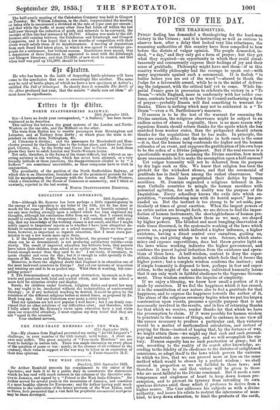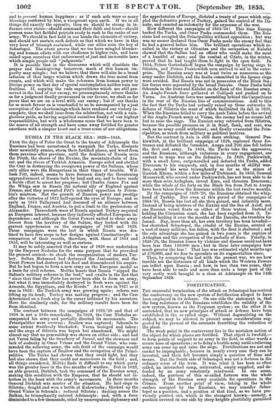TOPICS OF THE DAY.
THE THANKSGIVING.
PUBLIC feeling has demanded a thanksgiving for the hard-won victory in the Crimea; and it is instructing as well as curious to observe how, after a delay that looked very like reluctance, the reasoning authorities of this country have been compelled to bow before the dictate of vulgar opinion. The people demanded, in- deed, " a day," and they only get a form of prayer ; but they get what they required—an opportunity in whioh they oould simul- taneously and concurrently express their feelings of joy and their sense of gratitude. Philosophy might have met them—if in this country worldly philosophy had the courage to speak out—with many arguments against such a ceremonial. It is foolish " to halloo before you are out of the wood "—absurd to thank the Judge for a favourable award, while he is in the midst of deliver- ing the judgment, with the critical half yet to come. While Im- perial France goes in procession to celebrate the victory in a " Te Deum "—while England, more in conformity with her colder cus- toms, contents herself with an Order in Council authorizing a form of prayer—probably Russia will find something to warrant her thanks. There is nothing which may not be celebrated in a " Te Deum "—even a St. Bartholomew's massacre.
If success is to be the test of the warrant for assuming the Divine sanction, the religious observance might be subject to an endless series of abuses. Logically, there is no more reason why rapacious Russia should return thanks for the spoils which she has snatched from weaker states, than the pickpocket should return thanks for the acquisitions that he has made. In principle, the cases are exactly alike; and the mistake in both cases is the same —it is, that the human being confounds the higher and the human estimates of an event, and supposes the gratification of his own hope to be the reflex of a Divine judgment. But if the real success is a questionable warrant for assuming the Divine sanction, how much more unreasonable is it to make the assumption upon a half-success Yet vulgar humanity will not be debarred from its purpose by dry logic such as this. We know that religion has been the pretext for the wickedest abuses, and that the ceremonial of gratitude has in itself been among the rudest observances. Our ancestors in these lands propitiated their deities by human sacrifices. St. Dominic organized a religious tribunal in Ro- man Catholic countries to mingle the human sacrifices with polemical agitation, for such in reality was the purpose of the Inquisition. Every schoolboy knows the evils into which su-
perstition, "overshadowing man with its horrid aspect," has per- suaded us. But the instinct is too strong to be set aside, par- ticularly at times of great exertion. When the largest powers of an entire nation are brought forth, we are driven to find the imper- fection of human instruments, the shortsightedness of human pre- vision. Our purposes, rough-hew them as we may, are shaped by higher powers. The blindest and most bungling observation of rude times discerned, in the systematic working of the laws which govern us, a purpbse which indicated a higher influence, a higher existence, having a direct control over ourselves, guiding us, coercing us, and giving shape to our sots. Science, which anato- mizes and exposes superstitions, does but throw greater light on the laws whose working indicates the higher government, and confirms the purest logical induction from the existence and opera- tions of those laws. A half-wisdom' content to deny the super- stition, ridicules the inborn instinct which feels that it knows the higher power ; but a complete wisdom confirms the instinct ; and if simple humanity is disposed to bow, perhaps in fear and super- stition to the might of the unknown, cultivated humanity learns that it only work in faithful obedience to the Supreme Govern- ment. Thus wisdom confirms the impulse of simplicity. If we enjoy a blessing, we know 'how small a portion of it is made by ourselves. If we feel the happiness which it has caused, it is the constitution of our nature also to feel a gratitude for that happiness, and to express the happiness towards the author of it, The abuse of the religious ceremony begins when we put too large a construction upon events, presume a specific purpose that is not necessarily involved in the results, and in lieu of returning thanks for that which we receive, render thanks for that which we have the presumption to claim. If it were possible for human wisdom to penetrate to the causes of things, and to embrace in one view all the causes necessary to produce a particular end, then victories would be a matter of mathematical calculation' and instead of praying for them—instead of hoping that, by the fortunes of war, we might attain them—we might say that such and such proceed- ings and materials are necessary, and we will aocquiplish the vic- tory. Human sagacity has no such penetration or grasp ; but it can, according to the reality of its search after knowledge, ac- cording to the fidelity of its obedience to the dictates of enlightened conscience, so adapt itself to the laws which govern the universe in which we live, that we can proceed more or less on the same method which would be chosen by a perfect wisdom : we shall succeed in proportion as we are faithful to those laws ; and therefore it may be said that victory will be given to those who are most faithful to the Divine command. But it needs a rare temperance and singleness of heart to keep down human pre- sumption, and to prevent its tyranny from intruding. its own spurious dictates amid those which it professes to derive from a higher source. The Czar addresses his subjects as with a divine authority, and issues his edicts to restrict the intercourse of man- , kind, to keep down education, to limit the products of the earth,
and to prevent human happiness ; as if such acts were so many blessings conferred by him, a vicegerent upon earth. If we in all things did exactly the opposite, then we should be strong in in- fluence over states—should command their faith and trust—should possess none but faithful patriots ready to rush to the ranks of our army. We should in fact hold in our hands the elements of victory, and should not sustain such defeats as that which we have in this very hour of triumph sustained, while our allies seize the key of Sebastopol. The event proves that we too have mingled blunder- ing and human edicts with our obedienoe to higher rule, and have called upon ourselves that enforcement of just and inexorable laws which simple people call "judgments." It is possible that in the discourses which will elucidate the prayer and thanksgiving tomorrow, much of this human im- purity may mingle ; but we believe that there will also be a broad infusion of that larger wisdom which draws the true moral from events, and which will make the reference from human power to Divine power on that day of special contemplation neither vain nor fruitless. If, copying the rude superstitions which are still pre- served in the land of our enemy, we presumptuously return thanks as for a judgment finally pronounced in our favour, we shall so far prove that we are on a level with our enemy; but if our thanks for so much favour as is vouchsafed to us be accompanied by a just conception of the shortcomings which have rendered our victory in- oomplete, then we shall issue from the celebration, not with a vain- glorious pride, as having acquitted ourselves finally of our highest responsibilities, but with a wholesome sense that we have been to the source of all strength and have come away fortified for greater exertions with a simpler heart and, a truer sense of our obligations.



































 Previous page
Previous page